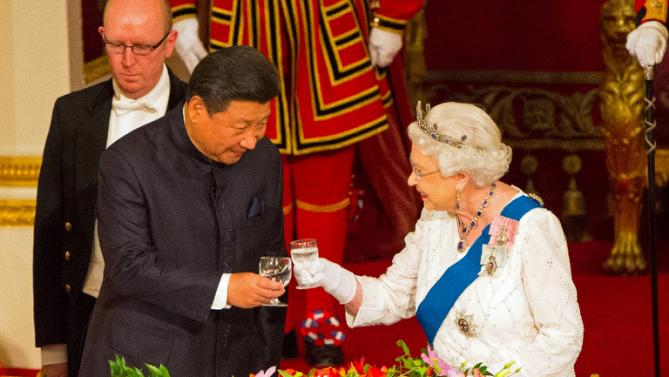Published in the Nikkei Asian Review October 27th 2015
If British Prime Minister David Cameron and Chancellor George Osborne carry on like this, they have an excellent chance of winning the Peace Prize. Not the one handed out by Sweden’s Nobel Academy, but the Chinese version, known as the Confucius Peace Prize, which was most recently bestowed on Zimbabwean president Robert Mugabe.
The scale and speed of the British pivot to China has been remarkable. Just days after concluding a difficult trip to Washington, Chinese President Xi Jinping was in London enjoying the fulsome hospitality of the British state, which ranged from a sleepover in Buckingham Palace to beer and fish-and-chips in a pub.
The subtext to the discussions in Washington was China’s challenge to the existing world order – the island-building in the South China Sea, the industrial espionage and hacking. In the UK all the talk was about a coming “golden decade” of Sino-British relations, as signified by the flotation of renminbi bonds in the City of London’s financial markets, Chinese investment in the UK’s nuclear power infrastructure and other deals. Human rights issues were explicitly sidelined.
Cameron’s enthusiastic embrace of Xi’s China met pushback from the military and security services and some politicians and commentators, but on the whole domestic opinion has been cautiously positive. The Financial Times editorialized that “commercial opportunities justify the gamble on goodwill.” The public appears to be in a similarly pragmatic mood. According to a poll by the YouGov market research firm, five times as many Britons want closer trade ties between the two countries as want weaker ones – even though only 29% have a favourable opinion of contemporary China.
The view from Washington is very different. Britain was the first Western country to sign up for China’s Asian Infrastructure Investment Bank, thus legitimizing an institution designed to compete with the post-war America-dominated world financial order. The Xi visit appears to mark a further distancing of the UK from American global strategy and a severe weakening of the so-called “special relationship” between the two countries.
Partly this is yet more blow-back from the Iraq war. As historian Niall Ferguson notes in an op-ed lauding Cameron’s China policy, it was “uncritical subservience to the US that destroyed the reputation of another prime minister,” meaning Tony Blair. On a deeper level it reflects the two countries’ diverging national interests, a far more important force than cultural affinities. Specifically the British government wants to secure the position of London as the key global financial centre. The opportunity to channel potentially vast financial flows after China liberalizes its capital account is seen as vital to this end.
The foreign policy implications are obvious. If the Dalai Lama – who Cameron reportedly promised not to meet again – can be thrown under the bus so quickly, what position would the UK take on other strategic issues? When the deals have been done and a Chinese company is operating a nuclear power station on the Essex coast built with Chinese technology, how would the UK government react to a violent crackdown on protests in Hong Kong or a clash with Japan over the Senkaku (Diaoyu in Chinese) islands?
The answer is probably in the same way as Japan has reacted to events in Ukraine, which is to say dutifully making the right noises, but doing little. From the Japanese perspective, the Ukraine crisis has little impact on its vital interests, except insofar as sanctions against Russia have stymied any chance of a deal over the Northern Territories, islands claimed by Japan but occupied by Russia. Likewise China’s repressive tendencies and territorial expansionism do not impinge on Britain’s vital interests, which are now more narrowly defined than for many centuries and may not include defending the rule of law in Hong Kong.
As Britain’s value as a strategic partner of the United States declines, so Japan’s is rising. While George Osborne was touring China, including the troubled Xinjiang region, with a delegation that included Treasury Minister Baron O’Neill of Gatley – formerly Jim O’Neill of Goldman Sachs and BRICS fame – Japanese Prime Minister Shinzo Abe was showing true political leadership. By expending precious political capital on pushing through necessary but unpopular new security laws he was bringing Japan’s security arrangements into line with twentieth first century realities. More will need to be done in terms of alliance building with other Asian countries if Japan is to secure its vital interests in the face of a fast-moving and increasingly assertive China.
The trick will be in managing the security relationship with the United States in a way that maximizes the benefits to Japan while avoiding the kind of disaster that destroyed Tony Blair. Here Britain has a more positive lesson to offer. Even in the most fraught period of the Cold War, when the “special relationship” between Britain and America was at its height, Britain declined to participate in the Vietnam War on the grounds that it had no vital interests in the region.
As is crystal-clear from the UK’s bet on China, the United States no longer leads “a free world alliance” capable of presenting a united front in all corners of the world. Rather it has different allies in different regions who may well have opposing agendas. As the US’s indispensable ally in East Asia, Japan has an unprecedented opportunity to secure its status as a crucial regional power while limiting its involvement in areas it deems non-critical.
In international relations as in human affairs, special relationships based on supposed inherent affinities can end in disillusion. Realistic relationships – based on matching needs and desires – are often more durable.
